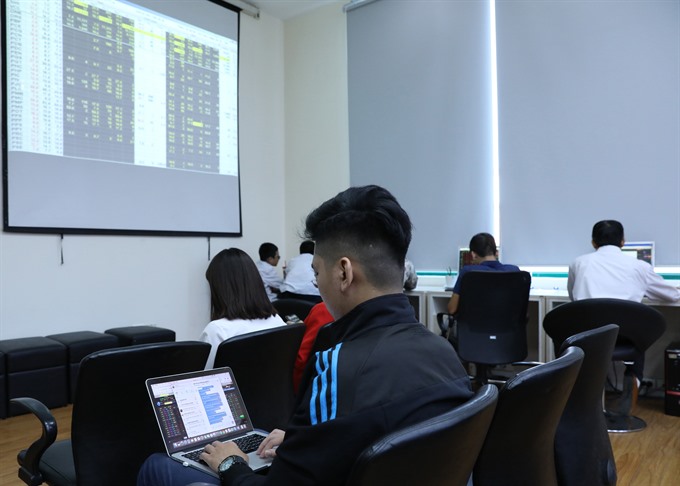Vietnamese shares are forecast to rise at a slower pace over the last two weeks of the year amid worries about volatile global markets and falling domestic purchases despite the upcoming quarterly earnings season.

Vietnamese shares are forecast to rise at a slower pace over the last two weeks of the year amid worries about volatile global markets and falling domestic purchases despite the upcoming quarterly earnings season.
Viet Nam’s two exchange indices – the benchmark VN-Index and the HNX Index – have performed well since mid-November, but their growth has shown signs of slowing in the year-end.
The VN-Index on the Ho Chi Minh Stock Exchange on Friday fell 0.85 per cent to close at 952.04 points, having moved up and down December 4. It gained 6.11 per cent in the last month.
The HNX Index on the Ha Noi Stock Exchange was down 0.61 per cent to finish last week at 106.65 points. A similar scenario was also seen on the northern market, which has increased 5.57 per cent over one trading month.
Prior to last week’s close, the two indices had respectively risen 4.42 per cent and 3.83 per cent in two weeks.
Friday’s declines on the two bourses were totally normal given the fact that local stocks had advanced well in the previous two trading weeks, VNDirect Securities JSC’s head of services division Nguyen Trung Du said.
“The local market was taken down by declining pressure of major global stock markets, such as the US and China. Plus, the appreciation of the US dollar also posed negative impacts on the market sentiment, weakening some large-cap stocks,” Du told tinnhanhchungkhoan.vn.
But in general, the outlook for large-cap stocks remained positive and investors were slowly changing their targets, Du said, adding changes were unlikely to boost the market in the remaining two weeks of the yea.
Liquidity was not strong enough to keep the indices growing because investors were too sensitive to international developments, which were seen as “negative”, according to analysts.
An average of more than 237.4 million shares was traded in each session last week on the two exchanges, worth VND5.08 trillion (US$223 million).
The figures were down from the previous week’s numbers of 245 million shares in volume and VND5.2 trillion in value.
International developments continued weighing on the market sentiment, especially the relationship between the US and China.
Early this month, a ceasefire agreement reached between the US and China during the G20 Summit was expected to boost trade relations between the two largest economies.
But the arrest of China’s tech giant Huawei CFO Meng Wanzhou sparked global worries about another escalation of the trade tensions between the two economies, which started in March 2018 when President Trump accused China of illegal intellectual property transfer.
Besides, the latest data also shows a slowdown of the Chinese economy, meaning its trade partners, including Viet Nam, may be affected to some extent.
“Global markets have underperformed on this news, and Viet Nam is not an exception,” Hoang Thach Lan, director of the individual investor division at Viet Dragon Securities Corp (VDSC), said.
“It has never been easy to ‘control’ global news, also known as external factors to the Vietnamese market, as it is too difficult to predict. This could cause the indices to grow more slowly than expected and extend the local market’s volatility in the next two weeks,” he said.
Q4 earnings season
Though the indices did not have big gains last week, the market sentiment seemed to improve, according to Nguyen Hong Khanh, analysis director at Vietnam International Securities JSC.
“Investors are finding opportunities in potential stocks ahead of the coming quarterly earnings season and that has improved the overall price level for the whole market,” Khanh said.
“We may keep an eye on banks and property firms as they are expected to create a rally at the year-end period as investors bank on their full-year earnings being huge,” he added.
Investors should also watch the fishery and textile and garment sectors as they were speeding up their businesses and their future prospects would benefit from new free trade agreements, he said.
Consumer goods firms should also be a target for investors because consumption often rises at the year-end when customers prepare for holidays and festivals, according to Lan at VDSC.
Shares in consumer companies such as Masan (HoSE) have gone up significantly in recent weeks. Masan has gained nearly 6.9 per cent since the end of November. – VNS





